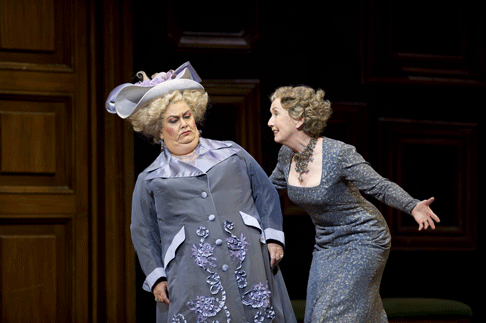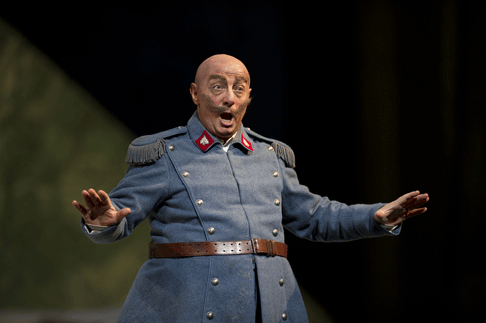First staged to glorious reviews in 2007, in fact this co-production
with the Vienna State Opera and the Metropolitan Opera, New York, has seldom
been ‘out-of-production’ during the last two years; but Covent
Garden has reassembled almost all the members of the original stellar cast,
re-uniting French soprano, Natalie Dessay, as the gamine, gambolling Marie,
with Juan Diego FlÛrez’ charming, heart-winning Tonio.
Even by the standards of 1840s opÈra comique, the libretto is
wildly implausible. But Pelly relishes the improbabilities and excesses,
envisaging Donizetti’s trifle as a Gilbert & Sullivanesque caper; his
staging abounds with visual gags which inject much energy humour into the text,
which is itself enlivened by some smart one-liners (‘It’s raining
soldiers’) and a co-mingling of English and French which neatly
complements the franglais accents on stage. Certainly, the manic
visual stimuli — lines of dancing long-johns, balletic dusting routines,
a coup de thÈ‚tre tank – deftly keep at bay any potential dramatic
languors; but, while satire is undoubtedly a vital element of the
genre there is perhaps a danger that Pelly’s farce indulges in just a
touch too much self-ridicule — surely Donizetti is sincere in his
flippancy and frivolity?
As the regiment’s adopted daughter/skivvy, Natalie Dessay is certainly
committed: from her first entrance — stumbling beneath a toppling mound
of regimental laundry — she flounces and flops, stamps and strops, wildly
throwing herself around the stage in a ceaseless comic routine ‡ la
Chaplin. Not afraid to squawk and screech, she savours the dialogue,
spitting out Gallic ‘Merde!’s a-plenty, and confirms her reputation
as one of the finest actors currently on the operatic stage. This is fast
becoming a signature role — and indeed it is hard to imagine this
production without Dessay — but there some alarming signs of
dramatic and vocal wear-and-tear. Her comic timing may be exemplary, with
coloratura pinging perfectly to a twang of the braces; and the top Ds and Es
may ring true and clear even as she is tossed and twirled by her military
‘daddies’; but the price to pay for such a breath-taking
performance may literally be the taking of Dessay’s breath. On more than
one occasion she seemed exhausted by her own exuberance and, worryingly, in
quieter moments her voice became rather pale, on occasion fading completely.
Punching out the regimental song as she darted up and down the map-inscribed
mountains of Chantal Thomas’s Act 1 set, Dessay effectively captured the
drive and ambition of the military milieu, but if familiarity breeds excess and
exaggeration, there is a danger that her performance could become a caricature
of itself.
If Dessay never quite attained a true bel canto lyricism, Juan Diego
FlÛrez’ light, high tenor is perfect for this part. Nonchalant leaps to
the 9 successive high Cs in ‘Ah, mes amis’ were more than matched,
even outshone, by a moving, tender declaration of love in his Act 2 aria,
‘Pour me rapprocher de Marie’. Although the voice is a little
unyielding, the homogenous, even beauty of tone is astonishing, and it was hard
to believe that the sweet, tenderness of the daringly hushed closing phrase
could fail to touch the heart of the daughter-denying Marquise de
Berkenfeld.
 Dawn French as La Duchesse De Crackentorp and Ann Murray as La Marquise De Berkenfeld
Dawn French as La Duchesse De Crackentorp and Ann Murray as La Marquise De Berkenfeld
For all Pelly’s attention to dramatic detail, there was however a
disappointing absence of genuine ‘chemistry’ between the star pair.
Fortunately, Ann Murray’s self-important Marquise and Alessandro
Corbelli’s soft-hearted Sulpice more than made up for this lack of erotic
spark, with masterly embodiments of haughty elegance and paternal indulgence
respectively. Her voice may lack some of its former sheen, but Murray knows how
to command a stage and her entrance aria, ‘Pour une femme de mon nom’, was
instantly engaging and convincing. Amusingly accompanying Dessay at the piano
during the singing-lesson scene, she more than matched the master Corbelli for
comic timing.
Queen of TV comedy, Dawn French, in the speaking role of the Duchess de
Crackentorp, reprised her Vicar of Dibley trademarks, eliciting laughs by the
mere raising of the eyebrow and stopping just a whisker short of overkill.
Donald Maxwell as Hortensius completed the ‘dream cast’. They were
complemented by a superb male chorus, although their female counterparts,
admittedly less busy, were not quite up to the rest of the regiment’s
mark.
 Alessandro Corbelli as Sulpice Pingot
Alessandro Corbelli as Sulpice Pingot
Bruno Campanella conducted a rather scruffy performance from the Royal Opera
House orchestra: although the pit-stage balance was excellent, the tempi were a
bit ragged, and cast and band were occasionally out-of-step. However, things
tightened up in the second Act, and a stunning solo ’cello introduced
Dessay’s ‘C’en est donc fait’.
Florez’ light elegance shows no signs of waning, but Dessay can surely
not reprise this role indefinitely. Although her Marie is at times less
hyperactive tomboy and more hysterical Lucia, this is not a show to miss. Grab
a ticket — even if you have to mount a military campaign to hunt one
down.
Claire Seymour
image=http://www.operatoday.com/LA-FILLE-BC20100514078-FLOR.gif
image_description=Natalie Dessay as Marie and Juan Diego FlÛrez As Tonio [Photo by The Royal Opera / Bill Cooper]
product=yes
product_title=Gaetano Donizetti: La Fille du rÈgiment
product_by=Conductor: Bruno Campanella;Tonio: Juan Diego FlÛrez; Marie: Natalie Dessay; Sulpice: Alessandro Corbelli; La Marquise de Berkenfeld: Ann Murray; Hortensius: Donald Maxwell; La Duchesse de Crackentorp: Dawn French. Director: Laurent Pelly. Associate Director/Dialogue: Agathe MÈlinand. Revival Director: Elaine Kidd. Set Designer: Chantal Thomas. Costume Designer: Laurent Pelly. Lighting Designer: JoÎl Adam. Choreography: Laura Scozzi. Royal Opera House, Covent Garden. Monday 17th May 2010.
product_id=Above: Natalie Dessay as Marie and Juan Diego FlÛrez As Tonio
All photos by The Royal Opera / Bill Cooper